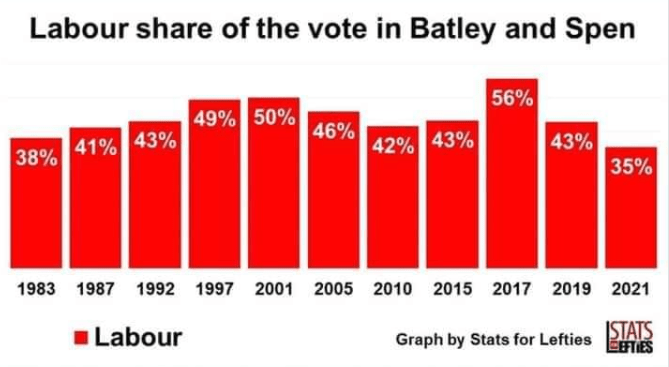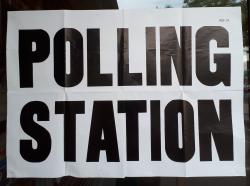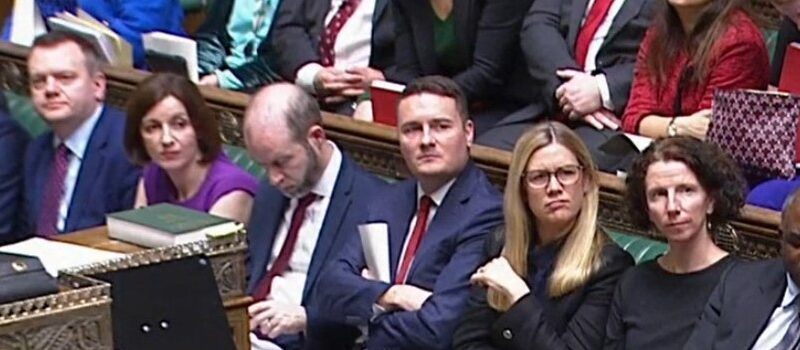We have fortunately cut across what was in danger of becoming a tired procession of Labour electoral failures under Keir Starmer, although only by a whisker. Those around Starmer’s leadership will be enormously relieved, not to say triumphant, by a result that in previous years would have been considered a disaster.
But in reality, although it probably prolongs the awful leadership of Starmer for a few more years, the by-election result is little short of a disaster. Where the Labour Party won over 29,000 votes at the height of the Corbyn leadership in 2017, it got less than half of that, albeit on a low poll typical of by-elections. Labour’s vote, at 35%, was lower than in all of the previous ten general elections, and had it not been for the Matt Hancock fiasco, the Tories may well have won.
Another defeat may have meant the end of the Starmer leadership, after losing the last two by-elections in Hartlepool and Chesham and Amersham, in the latter case with the smallest-ever recorded vote (under 2%) for the Labour Party in a by-election.
Crawling across the winning line
In the event, Kim Leadbeater, the Batley and Spen Labour candidate, and sister of former Labour MP Jo Cox, who was murdered in 2016, managed to hold enough Labour votes to stagger across the winning line. The Labour leadership must have thought it was a brilliant stroke to shoehorn in Joe Cox’s sister as the candidate, but Leadbeater suffered the fate of all Labour candidates, in that her campaign was largely a vote on Keir Starmer’s Labour Party and what it stands for.
Not that Leadbeater went out of her to way to put forward ‘Labour’ values and policies. It looks like the main part of her campaign was based on the fact that she was local. In one ward, she put out leaflets – pink of course – that even failed to mention the Labour Party or that she was the Labour candidate.
Although one of Starmer’s pledges in his leadership campaign was to “never lose sight of the votes” (Pledge 10), that is exactly what he is doing. Labour votes are disappearing fast and despite this narrow win, Labour’s right wing must now be looking at Keir Starmer and wondering how low the party can sink.
Mandelson’s jaw-dropping hypocrisy
In stark contrast to Starmer, Jeremy Corbyn comfortably won his first three by-elections, although that has not stopped right-wingers immediately after this by-election blaming Corbyn supporters for Labour’s poor showing in Yorkshire. In a jaw-dropping display of hypocrisy, Lord Mandelson called for a “period of silence” from Labour’s left-wing – this from the man who boasted about doing something “every day” to undermine Corbyn’s leadership!
Voters on the doorstep just don’t know what Starmer’s Labour Party stands for. As one cruel commentator in the Financial Times suggested, you could be a close observer of British politics for a couple of months and forget Starmer even existed. To say this is the fault of the left, fourteen months after he became leader just beggars belief.

The responsibility for the narrowness of this by-election victory and for Labour languishing behind the Tories in opinion polls lies wholly at the door of the right-wing cabal that dominates the parliamentary leadership and the apparatus of the party. They are moving the Labour Party in such a direction that it is increasing irrelevant to the lives and needs of ordinary working-class people.
Even the eight thousand-odd vote for George Galloway was a Labour loss waiting to happen. Socialists have no truck with Galloway, who ran a disgraceful campaign appealing to the worst homophobic and reactionary prejudices in the Muslim community and that was laughingly in the guise of a “Workers Party”.
Two different kinds of racism for Labour leadership
But Galloway would have had little effect if the Labour Party had been seen to offer something to the community to which he directed his poison, if Labour’s foreign policy on Israel/Palestine wasn’t determined by the Labour Friends of Israel and whoever happens to be the Israeli Prime Minister of the day.
In an article in the Guardian (June 20), two weeks before the election, some local Muslims were interviewed and they vented their frustration at Starmer’s unbalanced attitude to Israel and racism in Britain. “Keir took the time to condemn two idiots for being antisemitic last month”, one Muslim man said, “but he won’t condemn the Israeli government for killing innocent people.” As the article repeatedly pointed out, there was a feeling that Muslim voters had been “taken for granted” for decades.
“I’ve voted Labour my whole life”, another said, “but I won’t be blindly giving them my vote anymore. And that’s not just about Palestine. It’s everything locally. They’ve been in power here for 25 years but only now they’re under threat do they care about Asians.”
Anonymous briefing to the Sunday Mail
One of the features in the article – and something that is clearly perceived in the Muslim community – is the way Starmer’s approach to anti-Semitism differs from his approach to other forms of racism, notably Islamophobia.
“The Labour Muslim Network wrote to Starmer and others to complain about an anonymous briefing to the Mail on Sunday from a “senior Labour official” claiming that the reason the party was losing votes was a “backlash” from Muslim voters over “what Keir has been doing on antisemitism”. The clear implication in this briefing the LMN said was “that the Muslim community themselves harbour antisemitic views”, yet up to the point of the publication of the Guardian article, Starmer’s office had not replied.
While the right wing of the Labour Party will breathe a huge sigh of relief at the by-election win, it will be tempered by a longer-term fear that Starmer is going nowhere but backwards. The only single factor keeping the Parliamentary Labour Party from ditching Starmer tomorrow is the persistent fear of the radicalism of Labour’s membership and the danger in their eyes, that another left leader might be elected.
In a very revealing poll of Labour members, YouGov revealed that the members are well to the left of Starmer and the right wing. The details of the poll are worth looking at, but significantly, when asked how Starmer was doing as leader, 42 per cent thought he was doing ‘badly’ or ‘very badly’; among members under 25, the combined figure was 70 per cent and for under 50-year-olds 52 per cent.
Most party members still support 2019 manifesto policies
More importantly, when it comes to policy, members are clearly more to the left than the leader. Asked about the statement, “Labour should keep most of the policies that Jeremy Corbyn put forward at the last election”, an overall 51% agreed, (more than twice the number wanting to ditch them) with even bigger majorities for all younger age groups.

Another poll this week, this time by YouGov for SkyNews, suggested that more than two thirds of Labour members would prefer Andy Burnham as leader. The same poll showed that two-thirds of Labour members, 65%, believe Labour is now on course to lose the next general election with just 21% believing Labour are likely to win.
If they could get away with it, therefore, Labour’s right wing would happily revert to the old arrangements for leadership elections, whereby MPs had the biggest say. In a revealing article in the Huffington Post before the by-election – in which, by the way, it was clear that the predominant expectation on the Labour right was that Labour would lose Batley and Spen – some unnamed right-wingers argue precisely that.
Various unnamed sources in the Huffington article suggested that “A big bang change to water down members’ hold over the party leader” is an option. As one “senior aide” put it, “One of the big, most essential ways that Keir has to define himself is by changing the leadership rules to ensure that this great party never goes back to being run by cranks.”
Right wing would disenfranchise ‘cranks’ ie members
Labour Party members – us ‘cranks’ – need to be vigilant of the danger inherent in these remarks. It would seem unlikely at present that the right-wing would be strong enough to engineer the disenfranchisement of members, but in politics, one can never say never. All of the previous leadership election models, including the ‘electoral college’, gave MPs a disproportionate level of influence and they are all attractive to the right wing.
In his e-mail to Party members, Keir Starmer described the by-election victory as “a fantastic achievement for the brilliant and brave Kim Leadbeater” and he lauded a campaign that was based on “Labour values – decency, honesty, and fairness.” It is notable that, as usual, he said nothing about policy. As many voters are telling pollsters all over the country, Labour voters just don’t know what Labour stands for.
In the real world, where the day-to-day problems of workers are dominated by issues like housing, low pay, stress at work, and so on, workers want to hear firm policy commitments from Labour that are in workers’ immediate interests. Platitudes like “decency, honesty and fairness” – which would be written into the policies of any political party – don’t cut the mustard.
GMB – not enough ‘bangs’ for our ‘buck’
In a relatively unnoticed interview in the Scottish Daily Record this week, the new general secretary of the GMB union, Gary Smith, has questioned his union’s link with the Labour Party. Smith is on the right of the party; his union sponsors MPs who are overwhelmingly on the right and the union delegations always support the right at party regional and national conferences, against Open Selection, for example.
Why then, does he say in the Daily Record that “bluntly it is Keir Starmer’s problem to sort out the Labour party, not ours?” Elsewhere, he notes that his union has “ploughed millions into Labour coffers” and when asked if the union was getting got “bang for buck” with these donations to Labour, replied “definitely not.”

“Our mission”, Smith says, “is for ordinary working people to get organised under the banner to change things for themselves.” There are members of the GMB who will ask why this revelation didn’t come a lot sooner, when the union was sponsoring specifically the right of the party. But leaving that aside, the outburst from Smith is quite remarkable.
Trade union members fighting against fire-and-rehire and low pay
It signifies that even right-wing union leaders can feel the ground shifting beneath their feet, as their members struggle against fire-and-rehire, against low pay and in general fight to keep their heads above water. Although Smith himself may not understand what is happening, the economic and social imperatives of daily life will affect his members and his union. Just as the ground will move under Smith’s feet, it will similarly affect all the trade union leaders and, more indirectly, the Labour Party, in much the same way.
Keir Starmer may have stemmed the tidal wave of criticism for now, but the right wing of the party is organically incapable of offering anything concrete to working class people. Even in a period when the capitalist system is in crisis, the instinct of the right is to preserve the system at any cost.
The tension between the right and left of the party arises from the fact that fundamentally they reflect the pressures of opposing class interests. As these contending class interests sharpen, as they will in the coming years, so the clash of policies in the Labour Party will also become more acute and not less. There has never been a greater need for a fight for bold socialist policies, to counteract the policies of Labour’s right wing that are increasingly seen as weak and, for working people, meaningless.



